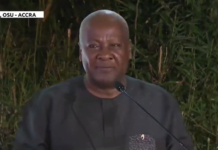
US President Donald Trump paid $38m (£31m) in tax on more than $150m (£123m) income in 2005, a leaked partial tax return shows.
The two pages of tax return, revealed by US TV network MSNBC, also showed he wrote off $103m in losses. It gave no details on income sources.
The White House said publishing the tax return was against the law.
Mr Trump refused to release his tax returns during the election campaign, breaking with a long-held tradition.
How was it found?
On Tuesday evening, MSNBC announced that it had a copy of one of Mr Trump’s tax returns, dating from 2005.
The details were revealed on a show later that night, anchored by journalist Rachel Maddow.
MSNBC said they received the document from financial journalist and Trump biographer David Cay Johnston, who received it in the post from an anonymous source.
On the programme Mr Cay Johnston confirmed he had no further details on the source, but speculated that the leak could have come from Mr Trump himself.
Although leaking federal tax returns is a criminal offence, Ms Maddow argued that the network was exercising its right to freedom of speech under the First Amendment to the US Constitution to publish information in the public interest.
On Wednesday morning, President Trump slammed Mr Cay Johnston on Twitter, and cast doubt on the claim that the papers came unsolicited through the post.
The Pulitzer Prize-winning journalist said he and his family received threats over the report, calling it a “disturbing sign of how Trump damages civil debate”.
“Trump fans call & harass my wife & one of my children after I break story White House confirmed. Sad! Let’s have open debate, not threats,” he tweeted.
What have we learnt?
The release showed Mr Trump paid the Internal Revenue Service $38m in 2005, an effective tax rate of 24%.
This is higher than the average American citizen would pay but below the 27.4% averaged by higher-earning taxpayers.
The bill comprises $5.3m in federal income tax and an extra $31m in what is called alternative minimum tax (AMT).
AMT was set up nearly 50 years ago to stop the wealthiest people from using deductions and loopholes to avoid paying taxes. Mr Trump has called for it to be abolished.
What don’t we know?
President Trump’s critics have wanted to know more about his income tax payments, but they also want more transparency on his business ties, particularly on any links to Russia. No substantial business links have been proven.




